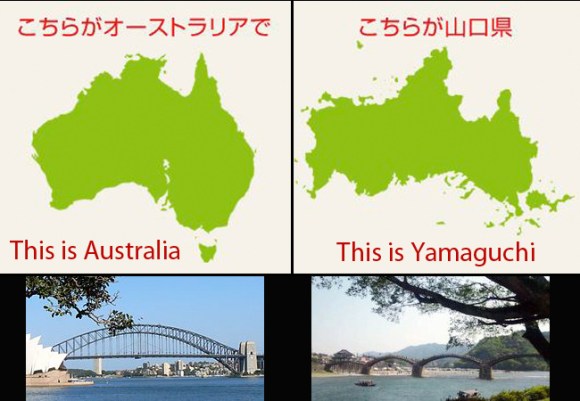
Move over, Land Down Under! The “Administrative District Down and Off to the Side” of Japan not only looks like you, but can go toe-to-toe with many of your attractions.
A few years ago, the official website for the rural prefecture of Yamaguchi revealed a startling discovery that its shape bore a striking resemblance to the Australian continent. Digging a little deeper they found that many of the features which make Australia great could also be found in Yamaguchi in more or less the same area.
Ayers Rock is the landmark sandstone formation in the center of Australia is a sacred place for the aboriginal people, who refer to it by its original name Uluru. Part of the reverence comes from the bountiful waterholes and cave shelters than can be found in the area. Nowadays, it is a popular tourist attraction for its natural beauty and ancient art.
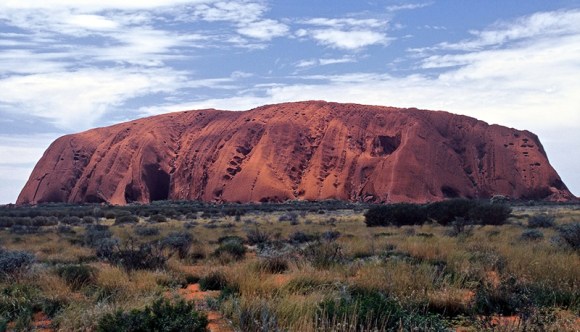
And right near the center of Yamaguchi Prefecture are the unusual rock formations of the Akiyoshidai plateau. This plateau consists of limestone forced up from below sea-level from tectonic movement, and while it’s not rich in waterholes like Ayers Rock, Akiyoshidai is a fountain of fossils and ancient artifacts to researchers.
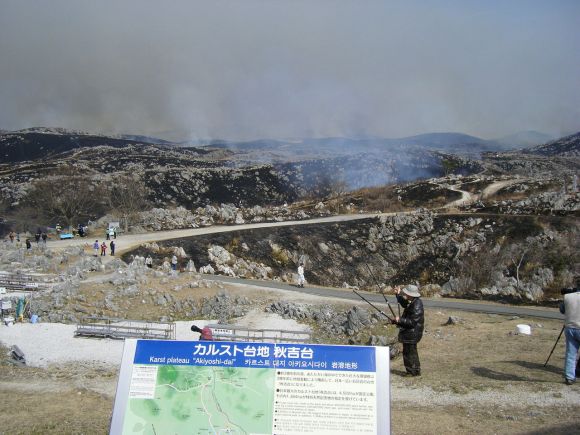
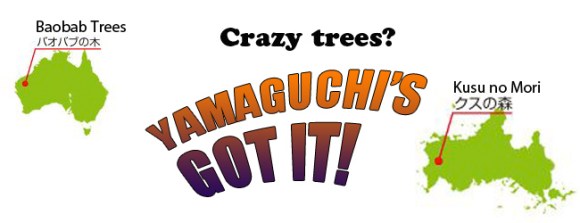
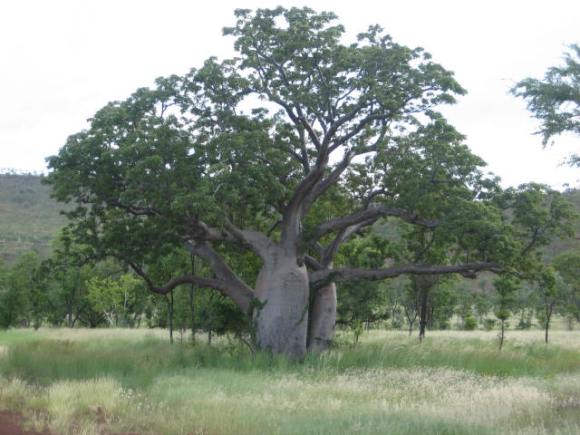
Boababs can be found in the west part of Australia and wouldn’t you know it? The west part of Yamaguchi Prefecture is home to the Kawatana no Kusu Forest. Although called a “forest” it’s actually just a single camphor tree that’s over 1,000 years old with a trunk that 11 meters (36 feet) in diameter and huge branches measuring up to 25 meters (82 feet) long.
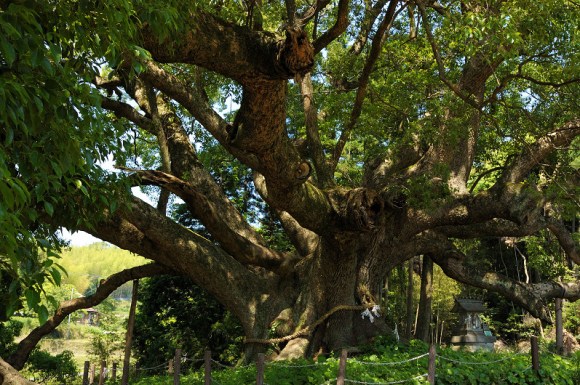
Chances are if you were to close your eyes and imagine Australia, the image of the Sydney Opera House next to the Sydney Harbor Bridge would spring to mind. And at just about the same location on the Yamaguchi Prefecture map you will find their landmark Kintai Bridge.
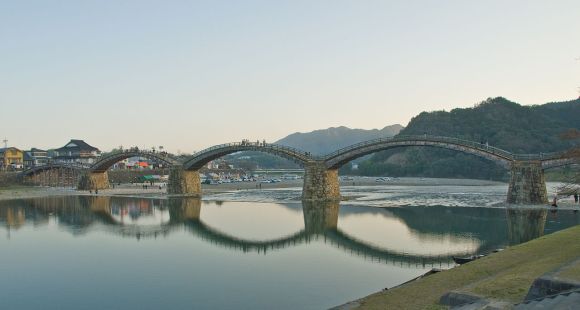
Although different in design and lacking the world renown of the Sydney Harbor Bridge, the wooden Kintai Bridge is over 300 years old and sure to leave a lasting impression. However, much like the Harbor Bridge, the Kintai Bridge is located near a thriving economic center. They have two soft-serve ice cream shops and a wide range of competitive fried potato croquette vendors.

Granted there’s no opera house by Yamaguchi’s bridge, but they do have some expressionist architecture in the way of the Shimonoseki Kaiyokan (Aquarium). It’s on the opposite side of the prefecture though which doesn’t unfortunately match up with Sydney. We are none of us perfect.
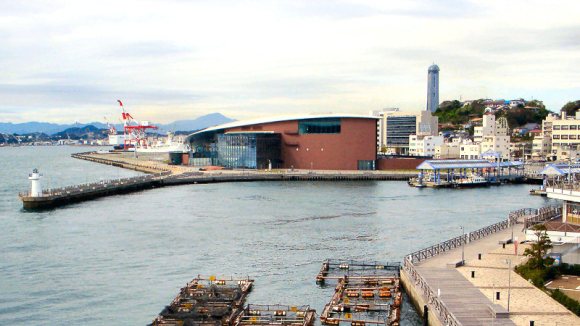
Along with kangaroos and koalas, emus are a symbolic animal of Australia. They’re even on the country’s coat of arms.
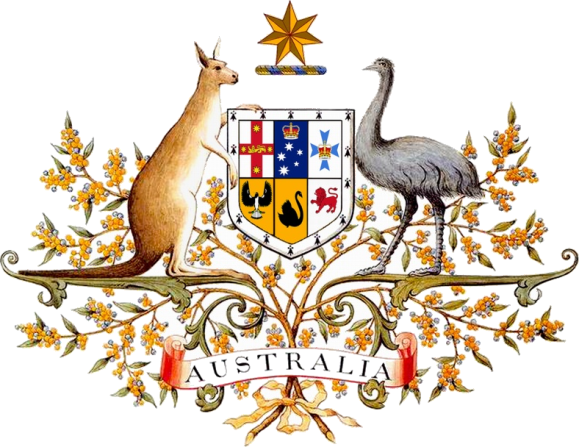
Yamaguchi Prefecture too has a bunch of emus tucked away on Futaoijima.
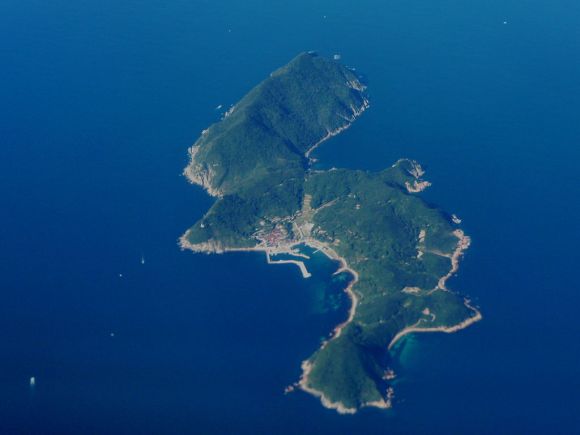
This island is home to only about 100 people but boasts a wonderful array of seafood and an emu farm. The directions to get there can be a little tricky though.
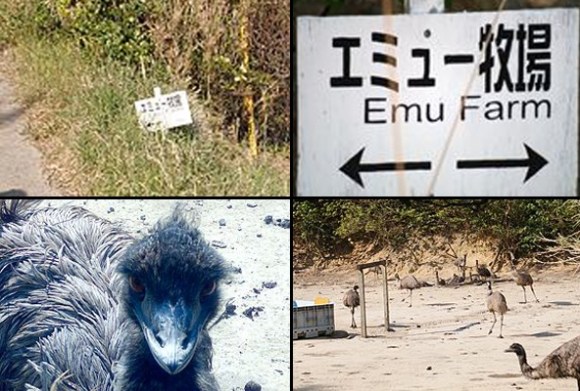
NOTE: According to the Yamaguchi website Futaoijima also boasts a sizable viper population. If you happen to be squeamish about such snakes, you may want to go in the winter months when they hibernate.
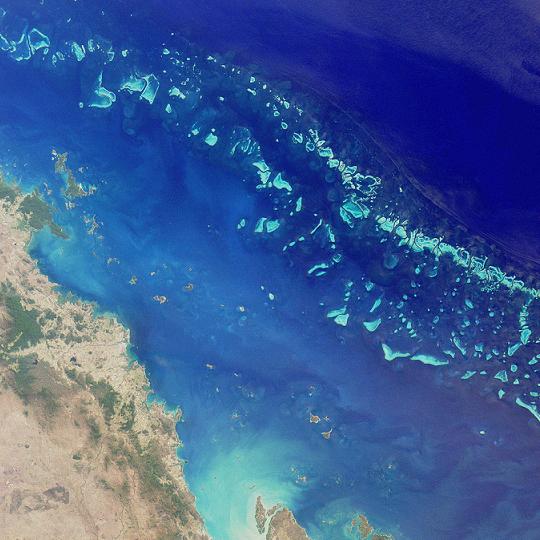
The Great Barrier Reef is a natural treasure of Australia that needs no introduction, but who knew that Yamaguchi also claims to have the world’s largest coral reef?
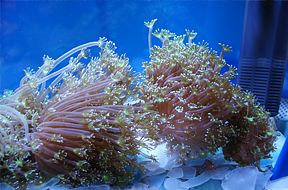
Okay, granted this is the world’s largest reef of, specifically, Alveopora japonica, also called Nihon Awasango (Japanese Daisy Coral). They don’t really look a whole lot like coral. Also, concrete data regarding Alveopora japonica populations in the world is not known. Nevertheless, if no one else is going to step up, Yamaguchi Prefecture’s just going to go ahead and say they have the most of these things.
Despite coming a long way in getting major franchises in recent years such as 7-Eleven and Pizza Hut. Yamaguchi Prefecture has still yet to get a Burger King restaurant opened.
However, if you want to get really nit-picky about it, Australia technically doesn’t have a Burger King either. Over there you’ll find Hungry Jack’s which is owned by Burger King and has almost the exact same logo, layout, and menu.
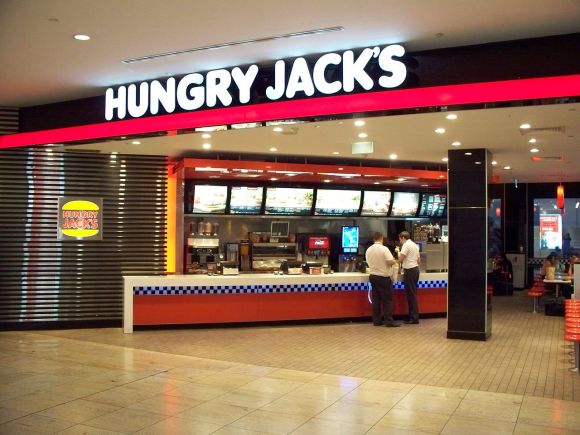
If Yamaguchi really wants to raise a stink about this we may call it a draw, but it’s probably better to call a Whopper a Whopper and just give this one to Australia.
In conclusion, it would seem the little old Yamaguchi Prefecture has pretty much every thing the entire continent of Australia has (except for Chicken Royales) in more or less the same locations. And while it is certainly no replacement for the full Australian experience, for those in Japan who lack the money to fly down under, it’s certainly a more affordable alternative.
Also for Australians who would like to see how your country would look in some alternate universe where everything is Japanese and smaller, Yamaguchi Prefecture is your place!
Source: Yamaguchi Prefecture via Twitter/@chaa_ruu (Japanese)
Top Image: Yamaguchi Prefecture (Edited by RocketNews24)

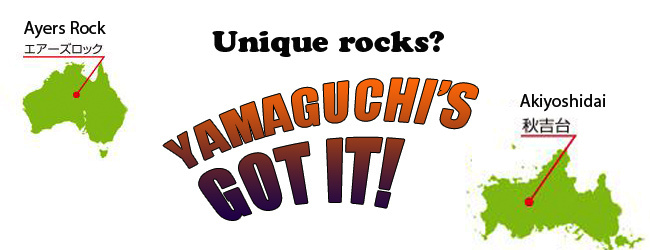
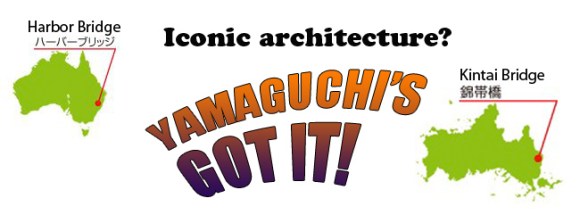
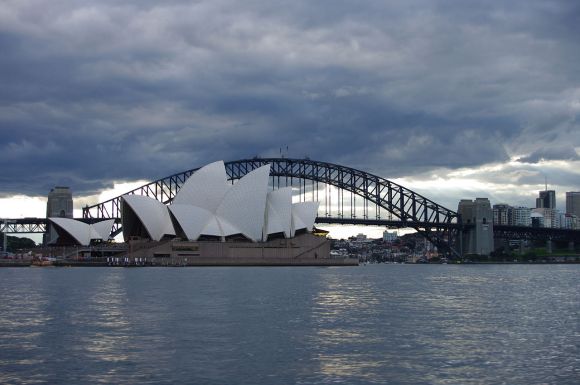
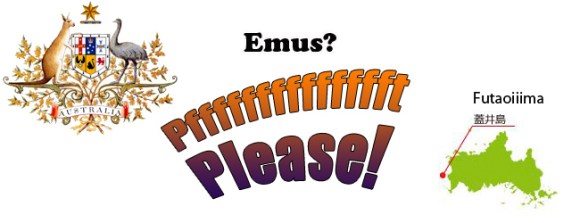
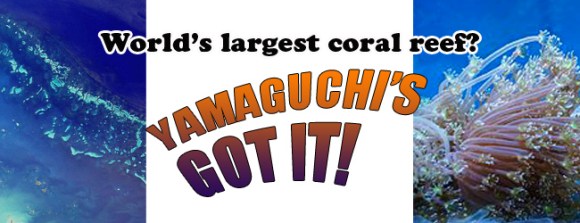

 Japan travel: Best things to see, eat and do in Shimonoseki in Yamaguchi Prefecture
Japan travel: Best things to see, eat and do in Shimonoseki in Yamaguchi Prefecture Three bridges in Okinawa Prefecture offer the most spectacular panoramic vistas of the sea【Pics】
Three bridges in Okinawa Prefecture offer the most spectacular panoramic vistas of the sea【Pics】 Japan travel: Best things to do, eat and see in Iwakuni and Yanai in Yamaguchi Prefecture
Japan travel: Best things to do, eat and see in Iwakuni and Yanai in Yamaguchi Prefecture Japan travel: Best places to see, eat and stay at Nagato and Mine in Yamaguchi Prefecture
Japan travel: Best places to see, eat and stay at Nagato and Mine in Yamaguchi Prefecture Starbucks Japan releases first-ever Hinamatsuri Girls’ Day Frappuccino
Starbucks Japan releases first-ever Hinamatsuri Girls’ Day Frappuccino Japanese restaurant chain serves Dragon Ball donuts and Senzu Beans this spring
Japanese restaurant chain serves Dragon Ball donuts and Senzu Beans this spring Tokyo street sweets: The must-snack treats of Nakano’s Refutei
Tokyo street sweets: The must-snack treats of Nakano’s Refutei Japan Extreme Budget Travel! A trip from Tokyo to Izumo for just 30,000 yen [Part 2]
Japan Extreme Budget Travel! A trip from Tokyo to Izumo for just 30,000 yen [Part 2] Miss World Japan: The great-times-20-granddaughter of samurai lord One-Eyed Dragon
Miss World Japan: The great-times-20-granddaughter of samurai lord One-Eyed Dragon Elephant nose ice cream: The treat with a trunk
Elephant nose ice cream: The treat with a trunk Draw like a Studio Ghibli anime artist with exclusive watercolour set approved by Hayao Miyazaki
Draw like a Studio Ghibli anime artist with exclusive watercolour set approved by Hayao Miyazaki Retro game group in Japan donating 100 Super NES systems to families with kids sheltering in place
Retro game group in Japan donating 100 Super NES systems to families with kids sheltering in place Man arrested in rural Japan on charges of leaving obscene DVDs in stores as gifts for “healthy men”
Man arrested in rural Japan on charges of leaving obscene DVDs in stores as gifts for “healthy men” Yakuzen ramen restaurant in Tokyo is very different to a yakuza ramen restaurant
Yakuzen ramen restaurant in Tokyo is very different to a yakuza ramen restaurant The 10 most annoying things foreign tourists do on Japanese trains, according to locals
The 10 most annoying things foreign tourists do on Japanese trains, according to locals Highest Starbucks in Japan set to open this spring in the Tokyo sky
Highest Starbucks in Japan set to open this spring in the Tokyo sky Tokyo Skytree turns pink for the cherry blossom season
Tokyo Skytree turns pink for the cherry blossom season Starbucks Japan releases new sakura goods and drinkware for cherry blossom season 2026
Starbucks Japan releases new sakura goods and drinkware for cherry blossom season 2026 Japan’s new “Cunte” contact lenses aren’t pronounced like you’re probably thinking they are
Japan’s new “Cunte” contact lenses aren’t pronounced like you’re probably thinking they are Shibuya Station’s Hachiko Gate and Yamanote Line stairway locations change next month
Shibuya Station’s Hachiko Gate and Yamanote Line stairway locations change next month Starbucks Japan adds new sakura Frappuccino and cherry blossom drinks to the menu
Starbucks Japan adds new sakura Frappuccino and cherry blossom drinks to the menu Japan just had its first same-month foreign tourist decrease in four years
Japan just had its first same-month foreign tourist decrease in four years Burning through cash just to throw things away tops list of headaches when moving house in Japan
Burning through cash just to throw things away tops list of headaches when moving house in Japan Japan’s newest Shinkansen has no seats…or passengers [Video]
Japan’s newest Shinkansen has no seats…or passengers [Video] Foreigners accounting for over 80 percent of off-course skiers needing rescue in Japan’s Hokkaido
Foreigners accounting for over 80 percent of off-course skiers needing rescue in Japan’s Hokkaido Super-salty pizza sends six kids to the hospital in Japan, linguistics blamed
Super-salty pizza sends six kids to the hospital in Japan, linguistics blamed Starbucks Japan unveils new sakura Frappuccino for cherry blossom season 2026
Starbucks Japan unveils new sakura Frappuccino for cherry blossom season 2026 Foreign tourists in Japan will get free Shinkansen tickets to promote regional tourism
Foreign tourists in Japan will get free Shinkansen tickets to promote regional tourism Take a trip to Japan’s Dododo Land, the most irritating place on Earth
Take a trip to Japan’s Dododo Land, the most irritating place on Earth Naruto and Converse team up for new line of shinobi sneakers[Photos]
Naruto and Converse team up for new line of shinobi sneakers[Photos] Is China’s don’t-go-to-Japan warning affecting the lines at a popular Tokyo gyukatsu restaurant?
Is China’s don’t-go-to-Japan warning affecting the lines at a popular Tokyo gyukatsu restaurant? Survey asks foreign tourists what bothered them in Japan, more than half gave same answer
Survey asks foreign tourists what bothered them in Japan, more than half gave same answer Japan’s human washing machines will go on sale to general public, demos to be held in Tokyo
Japan’s human washing machines will go on sale to general public, demos to be held in Tokyo Starbucks Japan releases new drinkware and goods for Valentine’s Day
Starbucks Japan releases new drinkware and goods for Valentine’s Day We deeply regret going into this tunnel on our walk in the mountains of Japan
We deeply regret going into this tunnel on our walk in the mountains of Japan Studio Ghibli releases Kodama forest spirits from Princess Mononoke to light up your home
Studio Ghibli releases Kodama forest spirits from Princess Mononoke to light up your home Major Japanese hotel chain says reservations via overseas booking sites may not be valid
Major Japanese hotel chain says reservations via overseas booking sites may not be valid Put sesame oil in your coffee? Japanese maker says it’s the best way to start your day【Taste test】
Put sesame oil in your coffee? Japanese maker says it’s the best way to start your day【Taste test】 No more using real katana for tourism activities, Japan’s National Police Agency says
No more using real katana for tourism activities, Japan’s National Police Agency says